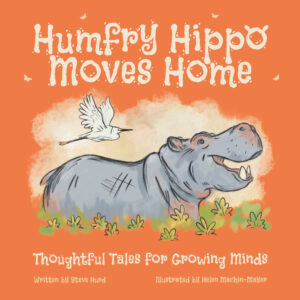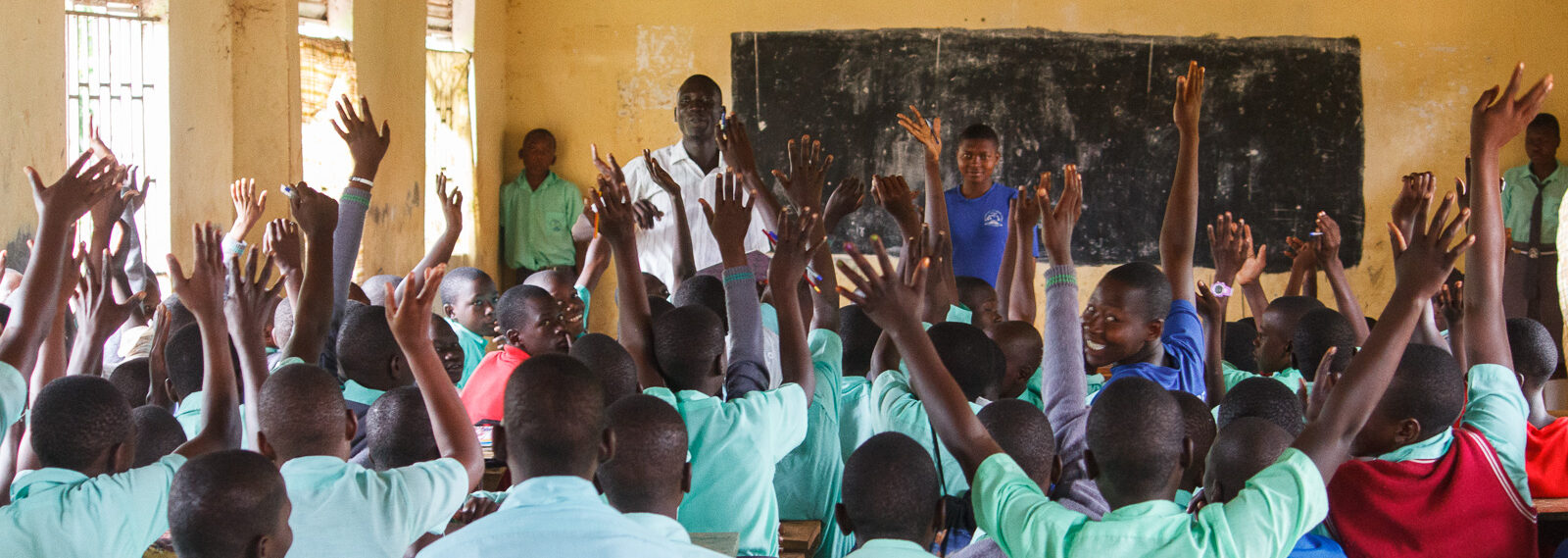 During the Covid-19 pandemic UHST has produced the first in a new series of books which seeks to help young children to develop a moral compass for a secular age. Initially written to be read to the children in the Humanist primary schools in Uganda, the universal themes explored in the books have wide international appeal.
During the Covid-19 pandemic UHST has produced the first in a new series of books which seeks to help young children to develop a moral compass for a secular age. Initially written to be read to the children in the Humanist primary schools in Uganda, the universal themes explored in the books have wide international appeal.
The series title is “Thoughtful Tales for Growing Minds”. Each book is designed to be read aloud by teachers and other adults, including parents and grandparents. The short stories provide cues for reflection and conversation with children about personal, social and global themes that arise.
The first book, “Humfry Hippo Moves Home”, addresses the challenges of moving away to another place. Humfry has to move when his waterhole dries up. Through Humfry’s experiences, children are prepared for the challenges of a real home move – missing old friends, feelings of loneliness, remembering, making new friends, settling in and enjoying a new home. Humfry remembers an ancient Ugandan folk myth that his grandmother used to tell. It explains how hippos lost their hair and explores jealousy and forgiveness.
Humfry and the other books should appeal to parents and teachers wishing to nurture thoughtful and caring children who wish to create a good life for themselves and for those around them. We aim, through the stories, to stimulate a love of the natural world and an appreciation of the challenges it faces.
Book details: Humfry Hippo Moves Home
5 short stories 40 pages for target age group 5-9 years.
Written by Steve Hurd and delightfully illustrated by Helen Machin-Mayer.
Published by Uganda Humanist Schools Trust.
ISBN 978-1-8382762-0-1 Price (Incl. P&P) UK & EU £10.00, Rest of World £14
Proceeds will be used by the Trust to support the education of needy children in Humanist Primary Schools in Uganda.
Cheques to: Uganda Humanist Schools Trust (UK), 31 Greenmeadows Road, Madeley, Crewe, CW3 9EY, UK
Credit card orders
Info: stevehurd@uhst.org +44 (0) 7773 972601
Comments by readers of the book:
“I love it. I really enjoy reading about Humfry.” Florence; “The stories are amazing!” Pietro
“This is a brilliant set of tales for children which entertain, educate and get them thinking about moral issues and living a good and happy life with their friends, families and communities.” Gillian, librarian, teacher and grandmother, UK.
“Our children love them, and our teachers enjoy using them. They encourage children to talk about their feelings and improve their English-speaking skills. The language level is perfect for primary age children in Uganda.” Juma, Katumba Parents Humanist Primary School, Uganda.
“I like the way real animal behaviour has been slipped into the tales as well as ideas for the children to express their views on human foibles.” Lynn, biologist and grandmother, UK.
“The Humfry Tales encourage children to talk in a thoughtful way about their feelings. The book is unique compared with the more usual rhyme and story books.” Hellen, New Hope Day Care Humanist Nursery School, Ntoroko, Uganda.

Posted: February 10, 2021 by Steve Hurd
Latest news from Mustard Seed School
https://ugandahumanistschoolstrust.org/21-ms-directors-report-feb-2021-r/
The report contains information about how the school is coping in the face of the Covid pandemic. It also includes a profile of this remarkable young lady, Joan Mukisa. The school gave her opportunities to develop her potential after a difficult start in life. Joan won a place in the top Law School in Uganda and is just starting her second year of study.
Posted: January 11, 2021 by Steve Hurd
A Big THANK YOU to all Supporters
The economic impact has been immense. National production is down 10% and many people have lost their jobs or suffered severely reduced incomes. This has affected charities raising funds to help others. Major national charities have experienced substantial falls in donations and been forced to cut programme budgets.
Compared to many charities, Uganda Humanist Schools Trust has weathered the storm fairly well so far. Since the onset of the pandemic in March 2020, a number of supporters have cancelled their monthly bank standing orders. However, most have remained committed to the charity and to children and staff in Humanist Schools in Uganda.
For example, a London musician who has supported our work in Uganda for some years has suffered a severe fall in his income. The closure of music venues due to the pandemic has caused his income from live performances to disappear. Some instrumental teaching has continued on Zoom video, but there has been a substantial fall in students and income. He had no alternative but to cut his standing order to UHST by 90%. However, he is strongly committed to supporting the Humanist Schools in Uganda and hopes to restore the cut once his income picks up again. We find it very moving that someone who has suffered from the economic impact of Covid still prioritises the liberal-Humanist education of needy children in Uganda.
We wrote to supporters explaining the immense negative impact of Covid on the schools we support. After months of closure, they are reopening in 2021 for exam classes only (other students will not be allowed to return until after Easter). It was looking as if they would need to lay off some staff and reduce the pay of those remaining in order to survive.
We are very grateful to all UHST supporters for sticking with our charity and the schools in Uganda during this difficult time. The work we are doing together is giving hope for a better life to so many needy children. We are determined that the efforts we have made together over the past 10 years will not be frustrated by the pandemic and we intend to restore the momentum the schools had before it started. A big thank you to all!
Posted: November 16, 2020 by Steve Hurd
Thoughtful Tales for Growing Minds
The series title is “Thoughtful Tales for Growing Minds”. Each book is designed to be read aloud by teachers and other adults, including parents and grandparents. The short stories provide cues for reflection and conversation with children about personal, social and global themes that arise.
The first book, “Humfry Hippo Moves Home”, addresses the challenges of moving away to another place. Humfry has to move when his waterhole dries up. Through Humfry’s experiences, children are prepared for the challenges of a real home move – missing old friends, feelings of loneliness, remembering, making new friends, settling in and enjoying a new home. Humfry remembers an ancient Ugandan folk myth that his grandmother used to tell. It explains how hippos lost their hair and explores jealousy and forgiveness.
Humfry and the other books should appeal to parents and teachers wishing to nurture thoughtful and caring children who wish to create a good life for themselves and for those around them. We aim, through the stories, to stimulate a love of the natural world and an appreciation of the challenges it faces.
Book details: Humfry Hippo Moves Home
5 short stories 40 pages for target age group 5-9 years.
Written by Steve Hurd and delightfully illustrated by Helen Machin-Mayer.
Published by Uganda Humanist Schools Trust.
ISBN 978-1-8382762-0-1 Price (Incl. P&P) UK & EU £10.00, Rest of World £14
Proceeds will be used by the Trust to support the education of needy children in Humanist Primary Schools in Uganda.
Cheques to: Uganda Humanist Schools Trust (UK), 31 Greenmeadows Road, Madeley, Crewe, CW3 9EY, UK
Credit card orders
Info: stevehurd@uhst.org +44 (0) 7773 972601
Comments by readers of the book:
“I love it. I really enjoy reading about Humfry.” Florence; “The stories are amazing!” Pietro
“This is a brilliant set of tales for children which entertain, educate and get them thinking about moral issues and living a good and happy life with their friends, families and communities.” Gillian, librarian, teacher and grandmother, UK.
“Our children love them, and our teachers enjoy using them. They encourage children to talk about their feelings and improve their English-speaking skills. The language level is perfect for primary age children in Uganda.” Juma, Katumba Parents Humanist Primary School, Uganda.
“I like the way real animal behaviour has been slipped into the tales as well as ideas for the children to express their views on human foibles.” Lynn, biologist and grandmother, UK.
“The Humfry Tales encourage children to talk in a thoughtful way about their feelings. The book is unique compared with the more usual rhyme and story books.” Hellen, New Hope Day Care Humanist Nursery School, Ntoroko, Uganda.